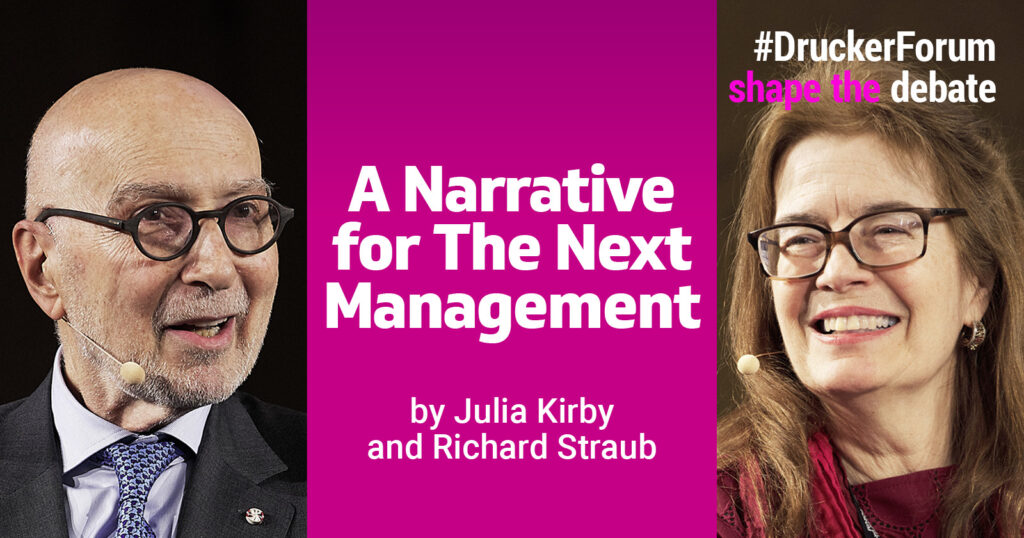
We are in the midst of a “poly-crisis” – a broad-based failure of institutions – all of them suffering loss of performance in a complex and unpredictable world, and all experiencing an erosion of trust.
“Business” as a sector is holding up relatively better, perhaps because people believe it is kept in line by competitive forces and a grounding in reality rather than ideology.
The practice of management is still largely based in its industrial age roots – the discipline has not adapted to this new age. Digital technology plays a key role as a disruptive force – we have all seen the latest developments in AI! Yet, especially in the public sector, we observe a doubling down on old-style bureaucratic approaches which are now simply “enhanced” by digital tech and AI. A new digital Taylorism seems to be on the rise.
We are seeing an acute crisis of the institutions of society. This institutional crisis transcends business. It relates to all the institutions that constitute our society—those responsible for health care, education, public services provision, cultural assets, etc.
Most are falling short in their effectiveness and performance. Drucker referred to them as collectively comprising the “Social Ecology” of our societies. We could also describe them as making up the institutional ecosystem of a modern society.
Management, which Drucker called a “social technology,” is one of the key levers to address this crisis of collapsing performance, trust, and legitimacy.
We need to move from industrial age management to a new version of this social technology better suited to achieving collective performance in institutions and organizations in today’s world (The Next Management). Drucker foresaw that the greatest management challenge of the 21st century would be increasing the productivity of knowledge work (just as the great challenge of the past had been to increase the productivity of manual work—a challenge that spurred the great productivity surges in the economies of the 19th and 20th centuries). The new challenge reflects the huge proportion of value that now comes from knowledge and IP versus traditional products and services.
The industrial age management is associated with a set of characteristics such as strict hierarchy, top-down command and control, centralization, technocratic and bureaucratic processes, economies of scale, and self-centered, institutional silo-thinking.
The characteristics of The Next Management should be markedly different: empowerment, trust, decentralization, antifragility, horizontal and bottom-up, agility, experimentation and learning, and human-centered. Managers in this mode recognize their organizations are embedded in ecosystems and take a holistic view of institutions as innovators and value creators.
But there is nothing inevitable about these characteristics. There is a danger that The Next Management could take another form, perhaps moving in the direction of Theory X (in Douglas McGregor’s famous model of competing assumptions about worker motivations). We could see essentially a “perfected” version of industrial age management emerge, with its worst tendencies turned, by the application of digital tech and AI, into truly technocratic and totalitarian features.
The transition from industrial age management to the next management is already happening – albeit at a too slow pace. Yet this transition doesn’t mean that the existing practices are all obsolete. New management practice portfolios will evolve using what was useful from old management and new approaches – dependent on the context in which the organization is operating. Drucker’s mantra of continuity and change is still valid.
…making society
higher performing
and more humane
at the same time, by
unleashing human
talent, creativity,
and ingenuity and
channeling it with
a sense of purpose.
When Drucker first became interested in the administration of large businesses and other organizations in the 1940s, he observed that there was no comprehensive framework of “management” as a discipline – although certainly there were bits and pieces of understanding about how to improve performance in different areas of operation. He pulled existing work and his own observations together to make it a discipline. Similarly, today, The Next Management is not wholly defined or clearly understood. Many elements exist – Agile, Scrum, Design Thinking, Lean Startup, Anti-Fragility, learning organization, digital transformation, and more – but are scattered efforts with limited interaction among the practitioners and thinkers developing them. The Drucker Forum with the Vienna Center for Management Innovation (VCMI) can serve as one of the catalysts to bring the elements for The Next Management together and describe the larger objective they collectively serve. We can, for example, redefine what it means to be a “human-centric” organization—in an age of AI and other powerful digital technologies.
At the core of our endeavor is Peter Drucker, and his fundamental tenet that management should concern itself with making society higher performing and more humane at the same time, by unleashing human talent, creativity, and ingenuity and channeling it with a sense of purpose.
This should be our overarching theme in the period between this year’s fifteen Drucker Forum to our twentieth event in 2028. It will ensure a common thread in what we do and give us an inspiring sense of purpose as we work to reposition management as a noble and constitutive endeavor in society.

